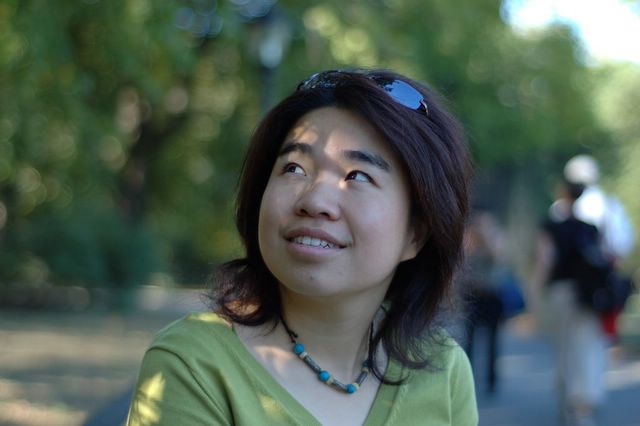Daily reflection
 Each person has his or her own daily ritual. For someone, it is writing blog; for others, it is chatting non-stop with strangers online. I find myself develop some new rituals as well. For instance, on Wed every other week, you can definitely find me around 8:00 pm at family circle H 110 of Metropolitan Opera house. On every Thursday, I go to grocery store cross the street to get my Portuguese bread. I also learn to talk non-stop with friends on cell phone, which most people do anyway. But for me, it is quite a new territory. Never dare to be so close to others, and I always feel to lose them afterwards. But now, I talk to more person than I ever did before. Talking is a good thing, it helps you to help others and help others to help you. By chance, I find a good person to chat today. Pei is recent graduate from Princeton's Econ department and worked at City as research associate. We share much research interest and know some common people. You just wonder how small the world is!
I went to Met to see Idomeneo yesterday. The opera was long and boring, even it is a masterpiece by Mozart. According to Wikipedia:
Idomeneo, re di Creta ossia Ilia e Idamante (Italian: Idomeneo, King of Crete, or, Ilia and Idamante; usually referred to simply as Idomeneo, K. 366) is an Italian opera by Wolfgang Amadeus Mozart. It was first performed at the Cuvilliés Theatre of the Residenz in Munich on January 29, 1781. Written when the composer was 24, Idomeneo was Mozart's first mature opera seria, and with it he demonstrated his mastery of orchestral color, accompanied recitatives, and melodic line. In certain aspects (e.g., the choirs), however, this opera is still an experimental drama, resulting more in a sequence of sets than in a well developed plot.
I think my big concern is that the whole play was more like a classic concert than an opera. The story line is in fact quite dramatic, but you feel like Mozart is flirting with you rather than giving you a Greek tragedy. His Marriage of Figaro is much more coherent in terms of music and plot and this one is a show of talent at most. On a second thought, I find out I might be wrong about what is opera and what should I expect to see on the stage. Opera is an art of music, and its vocal quality has ultimate position among all artistic effort involved. Now I am spoiled by the Met opera by its grand stage design, fantastic light work, and cinematic directing effect. In my mind, I wish to see something more like a gesamswerk rather than an opera. I am not satisfied because my limited knowledge of music keeping me from understanding Mozart's music and the production of this Mozart class also refuses to provide too much visual temptation. So I feel bored.
If I put my reflection in a broader sense, I feel there is a dilemma for any opera house. On one hand, they wish to attract more audience, especially young patriots who will become their long-term customers. To achieve this, they have to compromise their way of doing business, because the young audience are not used to the classic presentation and production. They are greed and insatiable, and push for more innovation in presentations. On the other hand, the opera houses treat themselves as the last retreat of classic music and have the responsibility of preserving the history. That is why Met Opera runs a humongous storage to keep all the customs, stage installations and production related document, and gradually becomes the library of classic opera. Tan Dun mentioned he had spent four years there as post-doc to learn and develop his own opera. I think it is true. To balance the competing needs for innovation and preserving the tradition, nowadays most managers of opera house rotate their repertoire back and forth between traditional and newly created operas, and old and new production of same opera. For instance, this season, you can find whole new productions of Madam Butterfly and The Barber of Seville. Meanwhile you can also enjoy the replication of earlier production, such as Tosca and Rigoletto. Besides, the Met offers you a chance to see its recent commissioned work, the First Emperor. It is very good marketing strategy and maybe the Chinese art theatres can learn something from Met’s experience. Someday, we will have our own Met at Beijng or Shanghai and let the common people to spend a night with shining stars.
Each person has his or her own daily ritual. For someone, it is writing blog; for others, it is chatting non-stop with strangers online. I find myself develop some new rituals as well. For instance, on Wed every other week, you can definitely find me around 8:00 pm at family circle H 110 of Metropolitan Opera house. On every Thursday, I go to grocery store cross the street to get my Portuguese bread. I also learn to talk non-stop with friends on cell phone, which most people do anyway. But for me, it is quite a new territory. Never dare to be so close to others, and I always feel to lose them afterwards. But now, I talk to more person than I ever did before. Talking is a good thing, it helps you to help others and help others to help you. By chance, I find a good person to chat today. Pei is recent graduate from Princeton's Econ department and worked at City as research associate. We share much research interest and know some common people. You just wonder how small the world is!
I went to Met to see Idomeneo yesterday. The opera was long and boring, even it is a masterpiece by Mozart. According to Wikipedia:
Idomeneo, re di Creta ossia Ilia e Idamante (Italian: Idomeneo, King of Crete, or, Ilia and Idamante; usually referred to simply as Idomeneo, K. 366) is an Italian opera by Wolfgang Amadeus Mozart. It was first performed at the Cuvilliés Theatre of the Residenz in Munich on January 29, 1781. Written when the composer was 24, Idomeneo was Mozart's first mature opera seria, and with it he demonstrated his mastery of orchestral color, accompanied recitatives, and melodic line. In certain aspects (e.g., the choirs), however, this opera is still an experimental drama, resulting more in a sequence of sets than in a well developed plot.
I think my big concern is that the whole play was more like a classic concert than an opera. The story line is in fact quite dramatic, but you feel like Mozart is flirting with you rather than giving you a Greek tragedy. His Marriage of Figaro is much more coherent in terms of music and plot and this one is a show of talent at most. On a second thought, I find out I might be wrong about what is opera and what should I expect to see on the stage. Opera is an art of music, and its vocal quality has ultimate position among all artistic effort involved. Now I am spoiled by the Met opera by its grand stage design, fantastic light work, and cinematic directing effect. In my mind, I wish to see something more like a gesamswerk rather than an opera. I am not satisfied because my limited knowledge of music keeping me from understanding Mozart's music and the production of this Mozart class also refuses to provide too much visual temptation. So I feel bored.
If I put my reflection in a broader sense, I feel there is a dilemma for any opera house. On one hand, they wish to attract more audience, especially young patriots who will become their long-term customers. To achieve this, they have to compromise their way of doing business, because the young audience are not used to the classic presentation and production. They are greed and insatiable, and push for more innovation in presentations. On the other hand, the opera houses treat themselves as the last retreat of classic music and have the responsibility of preserving the history. That is why Met Opera runs a humongous storage to keep all the customs, stage installations and production related document, and gradually becomes the library of classic opera. Tan Dun mentioned he had spent four years there as post-doc to learn and develop his own opera. I think it is true. To balance the competing needs for innovation and preserving the tradition, nowadays most managers of opera house rotate their repertoire back and forth between traditional and newly created operas, and old and new production of same opera. For instance, this season, you can find whole new productions of Madam Butterfly and The Barber of Seville. Meanwhile you can also enjoy the replication of earlier production, such as Tosca and Rigoletto. Besides, the Met offers you a chance to see its recent commissioned work, the First Emperor. It is very good marketing strategy and maybe the Chinese art theatres can learn something from Met’s experience. Someday, we will have our own Met at Beijng or Shanghai and let the common people to spend a night with shining stars.
 Each person has his or her own daily ritual. For someone, it is writing blog; for others, it is chatting non-stop with strangers online. I find myself develop some new rituals as well. For instance, on Wed every other week, you can definitely find me around
Each person has his or her own daily ritual. For someone, it is writing blog; for others, it is chatting non-stop with strangers online. I find myself develop some new rituals as well. For instance, on Wed every other week, you can definitely find me around  Each person has his or her own daily ritual. For someone, it is writing blog; for others, it is chatting non-stop with strangers online. I find myself develop some new rituals as well. For instance, on Wed every other week, you can definitely find me around
Each person has his or her own daily ritual. For someone, it is writing blog; for others, it is chatting non-stop with strangers online. I find myself develop some new rituals as well. For instance, on Wed every other week, you can definitely find me around 

没有评论:
发表评论